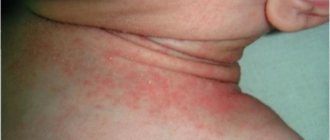An allergy is an extremely unpleasant and dangerous reaction of the immune system that occurs in response to a variety of substances. Drug allergies can cause a lot of trouble for patients and doctors. It is almost impossible to predict the development of a pathological reaction to an ordinary drug, and the consequences can be very serious for the body. It is especially difficult to deal with allergies if the medicine has not been prescribed by a doctor.
According to statistics, in 9 out of 10 cases this pathology develops while taking aspirin or drugs containing sulfonamides. In third place are antibiotics. Despite extensive research, it is still not possible to identify the true frequency of adverse reactions - most often patients do not seek help, and the symptoms go away on their own. While allergies are listed as a side effect in the instructions of almost all medications.
There are two fundamentally different types of allergic reactions:
- Immediate. They develop almost instantly after taking the medicine. Typically, an accelerated reaction leads to the development of life-threatening complications - Quincke's edema, anaphylactic shock.
- Slowed down. They appear gradually, the first signs are visible a few days after administration.
In an immediate reaction, symptoms include rash, itching, and swelling. Delayed is characterized by a wider range of clinical manifestations, and diagnosable changes occur in the results of laboratory blood tests.
At CELT you can get advice from a gastroenterologist.
- Initial consultation – 3,500
- Repeated consultation – 2,300
Make an appointment
Symptoms of the disease
Drug allergies very rarely become chronic; acute reactions develop more often
Typical symptoms:
- Hives, skin rashes, itching. The red bumps disappear when pressed. Skin symptoms persist for up to a day.
- Quincke's edema.
- Attacks of bronchial asthma.
- Allergic rhinitis (runny nose).
If symptoms go away on their own or while taking antihistamines, this does not mean that you can neglect consulting a doctor. Especially if the child has developed an allergy.
The most dangerous symptom that requires emergency care is anaphylactic shock. This is the name of a condition in which muscle spasms occur, suffocation develops, and swelling of the lungs and brain appears. To eliminate the threat to life, anti-shock measures are required, which can only be carried out by qualified physicians.
When the first symptoms of a drug allergy appear, it is recommended to follow the following algorithm of actions:
- The first step is to stop using the drug. If the reaction is just beginning to develop, this may be enough to prevent complications. Next, you should carefully monitor your well-being.
- If at least one of the symptoms appears and persists for 10 minutes, then you need to take an antihistamine - any that is at hand.
- If symptoms increase, or the effect of an antihistamine is not enough to relieve allergies, you should immediately consult a doctor.
Symptoms
Symptoms of a drug allergy depend on the type of hypersensitivity and whether the patient has other types of allergies.
How does an allergy to medications manifest?
- anaphylactic shock;
- fever;
- skin lesions;
- blood diseases;
- vasculitis;
- responses of the nervous system;
- hives;
- diseases of the mucous membranes;
- serum sickness;
- problems with the respiratory system;
- swelling;
- toxidermy.
The diagnosis is made on the basis of tests (including blood tests), collection of an allergic and pharmacological history, and a clinical picture. The doctor identifies the relationship between taking the drug and its consequences, collects data on the course of past treatment with this drug, and studies family history.
If a child is allergic to a medicine, the doctor analyzes the pregnancy period. Most information is provided by immunological/allergological tests. Please note that skin tests are not performed for this type of allergy in order to avoid complicating the situation and provoking anaphylactic shock.
Diagnosis and causes of drug allergies
Diagnosis begins with identifying the specific drug that provokes the development of allergies. In some cases this is obvious and a history may be sufficient. Sometimes you will need to conduct a series of allergy tests. In any case, diagnosis does not take much time.
To help the doctor make a diagnosis, it is worth preparing answers to the following questions: what medications the patient took before developing allergies, whether there have been similar episodes before, which medications the patient has been taking for a long time, and which ones were recently prescribed. It is important to accurately describe symptoms and record their duration.
The causes of drug allergies are simple and clear - the development of a pathological response to a substance that is part of the medication.
La-Cri products and their help in fighting rashes
In addition to medications prescribed by your doctor to treat drug rashes, you can use La Cree Cream for Sensitive Skin. Its use helps reduce the intensity of rashes, redness and skin itching. Due to the fact that the product contains such active ingredients as string, licorice, violet and walnut extracts, as well as panthenol and bisabolol, the cream has a pronounced anti-inflammatory, regenerating, antipruritic effect. Since La-Cree Cream for sensitive skin does not contain hormones, it can be used for a long time.
Treatment of drug allergies
Treatment directly depends on the severity of symptoms, the course of the underlying disease and the list of disease provocateurs. The treatment regimen is developed individually for each patient. First of all, you need to avoid taking provoking medications. If it is not known which drug is causing the allergic reaction, then temporary withdrawal of all medications is recommended.
First medical aid consists of gastric lavage (relevant if the medicine has been taken recently) and taking sorbents. The patient should be under medical supervision to avoid complications. In the presence of typical allergic manifestations (rashes, itching), standard antihistamines are prescribed - usually they are selected according to tolerability and depending on the experience of previous use.
If allergy symptoms intensify and taking antihistamines does not have the expected effect, intramuscular injections of hormonal drugs are prescribed. Most often, a single injection is sufficient. If necessary, the injection can be repeated after 6-8 hours. Treatment is continued either until stable positive dynamics appear or until the main allergic symptoms disappear.
In some cases, it makes sense to use long-acting glucocorticosteroids. If malaise persists during therapy, intravenous drips with saline are prescribed, and systemic intravenous corticosteroids are started. The dosage is calculated depending on body weight and the severity of the condition. Glucocorticosteroids are rarely used orally - only in cases where long-term therapy is required (this happens with the development of a number of rare syndromes).
The methods described above are used in situations where there is no significant threat to health. With the development of anaphylactic shock, specific anti-shock measures are required. After emergency treatment, the patient can be transported to the hospital. Medical supervision is required for at least a week. In addition to treatment, it is necessary to monitor the functions of the heart, kidneys and liver.
Emergency measures and hospitalization are required for patients with the following symptoms:
- Quincke's edema, spreading to the neck and face.
- Bronchial obstruction, severe respiratory distress.
- Complications from the heart, liver.
Patients who have already developed complications due to an allergic reaction should be especially careful.
Treatment of an allergic reaction is complex and involves a number of measures. Only a qualified specialist can prescribe therapy - and treatment must be supervised.
How to choose allergy medications?
Now there are a lot of different antihistamines. We offer both expensive original medicines and their more affordable popular analogues. When purchasing, you should follow the recommendations of your doctor and do not replace your own prescribed medication with a similar drug.
Selecting a medicine for allergies is the prerogative of an allergist. A specialist is able to accurately identify the allergen, identify the type and degree of the disease, and, based on all the data, select the best option for successfully blocking histamine receptors.
The main rule to follow
- this is an appeal to a trusted drug supplier. Only in this case can you avoid counterfeiting and not overpay for goods of dubious origin. The network of social pharmacies Stolichki guarantees the authenticity of medicines and offers a wide range of medicines at affordable prices.
Our doctors
Orlova Tatyana Vladimirovna
Doctor - allergist-immunologist, pulmonologist, doctor of the highest category
Experience 38 years
Make an appointment
Shundeva Oksana Veniaminovna
Allergist, doctor of the highest category
Experience 39 years
Make an appointment
Read also
Allergic bronchial asthma
What is allergic bronchial asthma Bronchial asthma is a fairly common chronic disease, which in most cases is allergic in origin.…
Read more
The concept of secondary immune deficiency
The concept of secondary immune deficiency Immunodeficiency disorders can be congenital or acquired. A congenital or primary disorder is something that a person is already born with. Purchased...
More details
Cold urticaria
Cold urticaria is a condition characterized by the onset of swelling and redness 5-20 minutes after exposure to cold or subsequent warming, most often localized on the face and hands.…
More details
Allergic dermatitis
What is allergic contact dermatitis? Anyone has ever experienced skin symptoms after using various skin care products, shower gel or shampoo. Such…
More details
Allergic vasculitis
Most often, this is a reaction to the administration of antibiotics, vaccines, contact with perfumes, fuels and lubricants, food intake, and the course of infectious and systemic diseases. There are various…
More details
Allergy prevention
Patients who have suffered an episode of drug allergy are contraindicated in the future to take the drug that provoked the attack. It is important to know that other drugs that have the same chemical properties can also be dangerous. This is due to the fact that the body reacts in the same way to chemically similar molecules. Drug allergies that develop due to substances of similar composition are called cross allergies.
There are lists and lists of medications that may cause cross-reactions. For example, if you are allergic to a drug from the group of beta-lactam antibiotics, you should not take other medications from this group.
It is important to ensure that the components of the allergen medication are not included in the complex medications used (many anesthetics are combination drugs).
There is also a rule that patients with allergies are not recommended to be prescribed more than three different drugs at the same time.
What to do to prevent the occurrence of drug-induced urticaria?
To protect yourself from developing a rash after taking medications, it is important to increase the body's defenses and not take medications uncontrollably. Among the preventive measures are the following:
- You cannot self-prescribe certain medications (especially antibiotics).
- You must take prescribed medications strictly according to the regimen recommended by your doctor.
- If you have had problems with a rash after taking medications in the past, be sure to tell your doctor.
- In the autumn-winter period, it is advisable to increase the body's defenses in every possible way, since it is the imperfection of the immune system that can lead to the development of a rash. To do this, it is recommended to take multivitamin complexes, eat fresh vegetables and fruits, drink natural juices, eat right and follow a drinking regime, play sports and spend time in the fresh air.
Desensitization
This is the name of the procedure that helps get rid of allergy symptoms if it is impossible to stop the drug. This happens with life-saving essential drugs.
The essence of the method is to gradually increase the dose from the minimum to the required for treatment. At the same time, reactions similar to those observed during allergy vaccination occur in the body. Desensitization techniques exist and are used for insulin, antibiotics and aspirin.
Effective diagnosis and treatment of drug allergies in the multifunctional CELT clinic. New treatment methods, qualified allergists, modern equipment - with CELT specialists it is easy to maintain your health.
Make an appointment through the application or by calling +7 +7 We work every day:
- Monday—Friday: 8.00—20.00
- Saturday: 8.00–18.00
- Sunday is a day off
The nearest metro and MCC stations to the clinic:
- Highway of Enthusiasts or Perovo
- Partisan
- Enthusiast Highway
Driving directions
Clinical researches
The effectiveness, safety and tolerability of La-Cri products have been clinically proven. The products are recommended by the Union of Pediatricians of Russia. During clinical studies, specialists were able to record excellent results.
It has been proven that La-Cri diaper cream:
- creates a protective barrier on the skin;
- relieves redness and irritation;
- provides gentle skin care.
Sources:
- Molochkova Yulia Vladimirovna, Dermatology. Brief reference book, GEOTAR-Media, 2022.
- Baumann Leslie, Cosmetic Dermatology. Principles and practice, MEDpress-inform, 2016.
- Ratner Desiri, Avram M.R., Avram M.M., Procedures in Dermatology. Clinical cosmetology, GEOTAR-Media, 2022.









